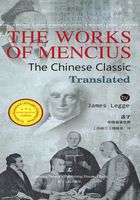
CHAPTER IX
1. The people of Yen having rebelled, the king ofCh'î said, 'I feel very much ashamed when I think of Mencius.'
2. Ch'ăn Chiâ said to him, 'Let not your Majesty be grieved. Whether does your Majesty consider yourself or Châu-kung the more benevolent and wise?' The king replied, 'Oh! what words are those?' 'The duke of Châu,' said Chiâ, 'appointed Kwan-shû to oversee theheir of Yin, but Kwan-shû with the power of the Yin State rebelled. If knowing that this would happen he appointed Kwan-shû, he was deficient in benevolence.If he appointed him, not knowing that it would happen, he was deficient in knowledge. If the duke of Châu was not completely benevolent and wise, how much less can your Majesty be expected to be so! I beg to go and see Mencius, and relieve your Majesty from that feeling.'
3. Ch'ăn Chiâ accordingly saw Mencius, and asked him, saying, 'What kind of man was the duke of Châu?'


CHAPTER 9. HOW MENCIUS BEAT DOWN THE ATTEMPT TO ARGUE IN EXCUSE OF ERRORS AND MISCONDUCT.
1. The people of Yen set up the son of Tsze-k'wâi as king, and rebelled against the yoke which Ch'î had attempted to impose on them. 'Ashamed when I think of Mencius,'—i.e. because of the advice of Mencius in regard to Yen which he had neglected. See Bk. I. Pt. II. x. xi.
2. Ch'ăn Chiâ was an officer of Ch'î. Châu-kung,—see Analects, VII. v, et al. The case Chiâ refers to was this:—On king Wû's extinction of the Yin dynasty,sparing the life of Châu's son, he conferred on him the small State of Yin from which the dynasty had taken its name, but placed him under the surveillance of his own two brothers, Hsien (鲜) and Tû (度), one of them older, and the other younger, than his brother Tan(旦), who was Châu-kung. Hsien has come down to us under the title of Kwan-shû, Kwan being the name of the principality which he received for himself. After Wû's death, and the succession of his son, Hsien and Tû rebelled, when Châu-kung took action against the,put the former to death, and banished the other. 监 (the 1st tone) 殷,—the 殷 here is the son of the sovereign Châu. That below is the name of the State. 解之,—I take 解 in the sense of 'to loose',


'An ancient sage,' was the reply. 'Is it the fact, that he appointed Kwan-shû to oversee the heir of Yin, and that Kwan-shû with the State of Yin rebelled?' 'It is.''Did the duke of Châu know that he would rebel, and purposely appoint him to that office?' Mencius said,'He did not know.' 'Then, though a sage, he still fell into error?' 'The duke of Châu,' answered Mencius,'was the younger brother. Kwan-shû was his elder brother. Was not the error of Châu-kung in accordance with what is right?
4. 'Moreover, when the superior men of old had errors, they reformed them. The superior men of the present time, when they have errors, persist in them. The errors of the superior men of old were like eclipses of the sun and moon. All the people witnessed them, and when they had reformed them,all the people looked up to them with their formeradmiration. But do the superior men of the present day only persist in their errors? They go on to apologize for them likewise.'


'to free from', with reference to the feeling of shame,not 'to explain'.
3. Before 然则, there should be a 曰, as it is the resort of Ch'ăn Chiâ. 圣人且有过与,—且 implies a succeeding clause—'how much more may one inferior to him!'—况下于公者乎. What Mencius means in conclusion is, that brother ought not to be suspicious of brother: that it is better to be deceived than to impute evil.
4. In 今之君子, the 君子 must be taken vaguely. 更,the 1st tone,=改. Shall we refer it to the sun and moon,or to the ancient worthies? Primarily, its application is to the heavenly bodies.

